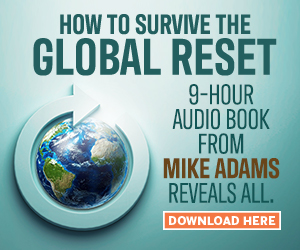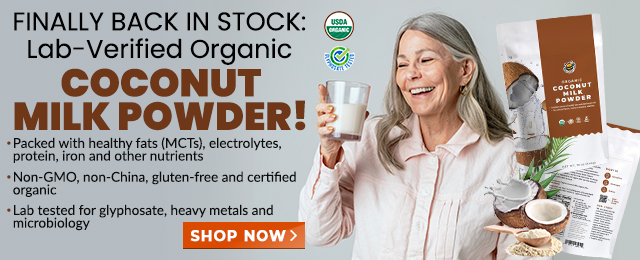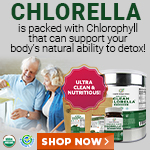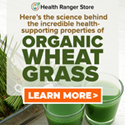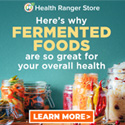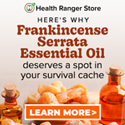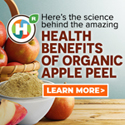
Vitamin D prevents heart disease
 Wednesday, November 25, 2009 Wednesday, November 25, 2009by Mike Adams, the Health Ranger Editor of NaturalNews.com (See all articles...) Tags: vitamin D, heart disease prevention, health news |
- European Court of Justice: Healthcare professionals who promoted or administered COVID-19 vaccines are CRIMINALLY LIABLE for any harm caused
- “Old Man in a Chair”: The COVID-19 pandemic was a carefully orchestrated scheme for global control
- Cinnamon plays a critical role in diabetes management
- Scientists unveil breakthrough method to eliminate "Forever Chemicals" from water, transforming waste into graphene
- FRAUD ALERT: Details DEMOCRATS do NOT want you to know about the $40 BILLION wasted on Fed-loaded credit cards cancelled by DOGE
- Newly released JFK files reveal Pentagon's role in creating Lyme disease and covid in the same lab
- Postcard from 1875 highlights smallpox vaccine’s failure: Lessons for today’s COVID-19 response
- Massive egg substitution recall: Bleach contamination sparks nationwide concern
- DOGE finds evidence of Social Security fraud and illegal immigrant voter registration
- AI-powered forecasting model proves more accurate than traditional systems at predicting the weather
- Zelensky defies Trump, rejects U.S. aid repayment and mineral deal amid rising tensions
- Preparing for the unthinkable with William Brocius’ “How to Survive the Death of the Dollar”
- Oncologist warns of ‘terrifyingly aggressive’ cancers in children, linked to immune suppression from COVID vaccines
- Pentagon memo suggests U.S. will not defend Europe from Russian aggression, prioritizing China and homeland security
- World Health Organization in crisis, prepares for DOWNSIZING after U.S. withdrawal and funding problems
- Trump administration deploys spy satellites to enhance southern border surveillance
- Science proves PASSION FRUIT is a powerful medicine for the GUT and the HEART
- EPA reconsiders Obama's CO2 “Endangerment Finding” - could unleash American energy freedom
- Newly released JFK files reveal Pentagon's role in creating Lyme disease and covid in the same lab
- Kiss Your Genetic Privacy Good-Bye! 23andMe Gets Green Light to Sell Your Intimate Genetic Details to Anyone They Want
- Oncologist warns of ‘terrifyingly aggressive’ cancers in children, linked to immune suppression from COVID vaccines
- Analysis: The coming economic collapse, a mass uprising and Trump's three secret weapons to halt the growing revolt
- European Court of Justice: Healthcare professionals who promoted or administered COVID-19 vaccines are CRIMINALLY LIABLE for any harm caused
- Dr. Suzanne Humphries makes bombshell appearance on Joe Rogan podcast, exposing vaccine industry deception back to POLIOMYELITIS
- Woman contracts WORLD'S DEADLIEST VIRUS after unknowingly being given the WRONG VACCINE
- NIH study, buried for decades, reveals that Flu Shots INCREASE elderly deaths, not prevent them
- Sugar-free deception: Artificial sweeteners hijack hunger signals, fuel obesity epidemic, study warns
- CDC finally halts $11 billion COVID funding scam as health officials admit the ‘pandemic’ was a fraud
- AI weather model outperforms traditional forecasts, boosts accuracy by 20%
- Black cumin seed oil emerges as a powerful ally against breast cancer and chronic inflammation
- Musk targets “strangely wealthy” lawmakers in DOGE probe, names Pelosi, McConnell, Schumer
- COVID-19 scandal linked to CANCER SURGE: Billionaire researcher sounds alarm
- “Independent” anti-Russia outlet MEDUZA faces COLLAPSE as US funding dries up
- The Health Ranger releases “Vaccine Zombie” song and music video, using AI-animated zombies for the music video
- DARPA: The shadowy innovator behind the world’s most advanced military technologies
- Britain’s descent into police state censorship: Parents raided for questioning their daughter’s school system online
- Newly released JFK files reveal Pentagon's role in creating Lyme disease and covid in the same lab
- California's social media censorship law struck down: A victory for free speech or a threat to online safety?
- EPA advisor admits the agency is funneling billions to climate groups ahead of Trump’s return to White House
- The Health Ranger releases “Vaccine Zombie” song and music video, using AI-animated zombies for the music video
- Dr. Mike Yeadon releases 15-minute testimony - WATCH - about genocidal intent of COVID “vaccines”
- Florida takes a stand: DeSantis proposes permanent ban on mRNA vaccine mandates
- Mike Adams releases country western hit single: Goin’ Back in Time is Comin’ Home
- Rep. Nancy Mace introduces bill to ban biological males from female facilities on federal property
- Unpacking the Lies That We’ve Been Fed – new song and music video released by Mike Adams, the Health Ranger
- “Why we influenced the 2020 elections”: Facebook files reveal the coordinated effort to bury the Hunter Biden laptop story
- House Intelligence Committee calls for the ARREST and PROSECUTION of Dr. Anthony Fauci
- Sugarcane extract superior to cholesterol-lowering drugs?
- The pandemic as a tool for INDOCTRINATION: Understanding “The Indoctrinated Brain” by Dr. Michael Nehls
- Survival 101: Effective EMF blocking techniques
- Mike Adams releases music poetry sensation: A Child of God
- Peter Rost exposes Big Pharma corruption in his book “The Whistleblower: Confessions of a Healthcare Hitman”
- Migrants are taking advantage of recent hurricanes to scam residents and loot their homes
- Michigan sheriff announces criminal investigation into 2020 election crimes, Dominion Voting Systems
- Red Cross issues warning to stop blood plasma donations from vaccinated people
- Scientists confirm: GENIUS brain function can be spontaneously unleashed in humans without any apparent cause
- EPA advisor admits the agency is funneling billions to climate groups ahead of Trump’s return to White House
- HYSSOP: What research reveals about the health benefits of this ancient holy herb
- Two containers with completed ballots fall out of truck in Florida
- Fully vaccinated about to see “tsunami” of illness and death, warns virologist
- Global leaders unite to clamp down on “misinformation” with UN-backed Cascais Declaration
- BREAKING: 2025 NDAA authorizes mandatory military draft of WOMEN across America… as Pentagon pursues global NUCLEAR war with both Russia and China at the same time
- Michael Yon warns of a ZIONIST TAKEOVER in Trump’s second administration
- Ozempic and Wegovy weight loss drugs are injectable LIZARD VENOM PEPTIDES that may unleash a devastating wave of organ failure… side effects align with symptoms of SNAKE BITES
- BOMBSHELL: DNA testing kits are a SCAM to develop ethnic-specific bioweapons
- Israeli soldiers accused of even more torture and abuse in the West Bank
- These 13 countries just signed an agreement to engineer a global FAMINE by destroying food supply
- NASA admits that climate change occurs because of changes in Earth’s solar orbit, and NOT because of SUVs and fossil fuels
- Newly released JFK files reveal Pentagon's role in creating Lyme disease and covid in the same lab
- RFK Jr. clears key hurdle: Sen. Susan Collins backs controversial HHS nominee, signaling a new era for health policy
- Sermon 30: How Jesus reveals Caesar’s FAKE CURRENCY and FALSE AUTHORITY
- Coriander seeds: Ancient medicine backed by modern science
But did you also know that vitamin D prevents heart disease? In fact, most people suffering from heart disease are chronically deficient in vitamin D. By correcting their vitamin D levels (through sunlight exposure or by taking vitamin D3 supplements), people can simultaneously halt cancer and prevent heart disease, too.
Here's a collection of research revealing the amazing power of this "miracle" vitamin to eliminate heart disease. I'd like to add, though, that the previously recommended daily intake of 400 IUs of vitamin D is now considered hazardously low. Most nutritionally-aware doctors and naturopaths are now recommending anywhere from 1,000 - 4000 IUs per day of vitamin D supplementation. Of course, you don't need any vitamin D supplements if you get sufficient sunlight on your skin on a regular basis.
Vitamin D prevents heart disease
Diabetes, both type-1 and type-2, are profoundly linked to low vitamin D levels. Obesity, heart disease, hypertension and stroke are inversely related to sunlight exposure and vitamin D levels. Psoriasis, eczema, and periodontal disease are lessened by sunlight exposure and high serum vitamin D. Fertility is positively influenced by sunlight exposure and high vitamin D levels. Sunlight enhances immune system function by producing vitamin D. Dozens of disorders other than those mentioned in this summary are related to vitamin D deficiency.- Solar Power For Optimal Health by Marc Sorenson
Vitamin D supplements are likely to be useful in preventing diabetes in areas where vitamin D deficiency is common. In a 1997 study looking at the links between environmental factors and Type II diabetes, vitamin D levels were assessed in 142 Dutch men aged from 70 to 88 years of age. Thirty-nine per cent were found to have low vitamin D levels and tests showed that low vitamin D levels increased the risk of glucose intolerance. Heart disease: Low vitamin D levels may also increase the risk of atherosclerosis.
- The New Encyclopedia of Vitamins, Minerals, Supplements and Herbs by Nicola Reavley
People should remember the total daily intake of vitamin D includes vitamin D from fortified milk and other fortified foods, cod liver oil, supplements that contain vitamin D, and sunlight. People who receive adequate sunlight exposure do not need as much vitamin D in their diet as do people who receive minimal sunlight exposure. Vitamin D increases both calcium and phosphorus absorption and has also been reported to increase absorption of aluminum. Increased blood levels of calcium (which may be a marker for vitamin D status) have been linked to heart disease.
- The Natural Pharmacy: Complete A-Z Reference to Natural Treatments for Common Health Conditions by Alan R. Gaby, M.D., Jonathan V. Wright, M.D., Forrest Batz, Pharm.D. Rick Chester, RPh., N.D., DipLAc. George Constantine, R.Ph., Ph.D. Linnea D. Thompson, Pharm.D., N.D.
Osteoporosis is closely correlated to heart disease. Vitamin D deficiency could certainly be a factor in both, because there is a strong inverse relationship between vitamin D levels and artery calcification; the more D in the blood, the less the calcification. Artery cells have vitamin D receptors (VDR), which when stimulated by vitamin D, inhibit the incursion of calcium.
- Solar Power For Optimal Health by Marc Sorenson
"I think vitamin D is an important ingredient in the longevity recipe," he said enthusiastically, as if just struck by an epiphany. "Your skin manufactures vitamin D when it comes into contact with the sun. Without that vitamin D, we increase our risk for nearly all age-related diseases including many types of cancer, high blood pressure, diabetes and even autoimmune diseases like MS (multiple sclerosis)." Insufficient vitamin D markedly accelerates heart disease in kidney patients.
- The Blue Zones: Lessons for Living Longer From the People Who've Lived the Longest by Dan Buettner
Based on the evidence from these studies, there is no reason to take vitamin D or calcium, ever. You can get all the vitamin D you need by taking a walk in the sunshine, especially in winter, since sunlight stimulates natural formation of vitamin D. However, if you want to take vitamin D there is no risk.
- Before You Take that Pill: Why the Drug Industry May Be Bad for Your Health by J. Douglas Bremner
To ensure adequate supplies of vitamin D, get at least twenty minutes of sun exposure on the face and hands each day. If that is not possible, take 400 to at most 1,000 milligrams of vitamin D supplements daily. Do not take more than 1,000 milligrams of vitamin D daily or take the supplement for more than six months; excessive use of vitamin D is associated with atherosclerosis and heart disease. Vitamin D is needed for calcium to enter bones, and a deficiency of this vitamin is a major risk factor for both osteoporosis and bone fracture.
- Prescription for Herbal Healing: An Easy-to-Use A-Z Reference to Hundreds of Common Disorders and Their Herbal Remedies by Phyllis A. Balch, CNC
In addition, people who receive adequate sunlight exposure do not need as much vitamin D in their diet as do people who receive minimal sunlight exposure. Vitamin D increases both calcium and phosphorus absorption. Vitamin D has also been reported to increase absorption of aluminum. Increased blood levels of calcium (which can be a marker for vitamin D status) have been linked to heart disease. Some, but not all/ research suggests that vitamin D may slightly raise blood levels of cholesterol in humans.
- The Natural Pharmacy: Complete Home Reference to Natural Medicine by Schuyler W. Lininger, Jr. DC
Low vitamin D levels may also increase the risk of atherosclerosis. Research suggests that a low level of vitamin D increases the risk of calcium build-up in atherosclerotic plaques, and that higher levels reduce the risk of build-up. Researchers at UCLA School of Medicine measured the vitamin D levels in the blood of 173 men and women at risk of heart disease and also measured the build-up of calcium in coronary arteries (a common finding in coronary artery disease). The results suggest that calcium may regulate calcium deposition in the arteries as well as in the bone.
- The New Encyclopedia of Vitamins, Minerals, Supplements and Herbs by Nicola Reavley
UVB light is available in Florida essentially year round for the production of vitamin D. This is significant today - even more than historically - because vitamin D and a healthy diet represent a real Fountain of Youth. The most prevalent health problems of old age are arthritis, osteoporosis, heart disease, cancer, and dementia, and all of these respond favorably to normalization of vitamin D levels and diet. The Vitamin D Cure goes beyond the mythical Fountain of Youth for seniors because it's a Fountain for Youth, too.
- The Vitamin D Cure by James Dowd and Diane Stafford
Vitamin D - reduces heart disease risk in women. It was reported at the 42nd annual conference on Cardiovascular Disease and Epidemiology Prevention that women who take vitamin D supplements lowered their risk of death from heart disease by one-third. The finding was an unexpected dividend extracted from an osteoporosis trial to determine the incidence of bone fracture in nearly 10,000 older women. From the trial participants, 4200 women reported taking vitamin D supplements at the onset of the study; another 733 reported a prior history of supplementation.
- Disease Prevention and Treatment by The Life Extension Editorial Staff
Without enough vitamin D, adults are prone to osteoporosis and children are prone to a disease called rickets that results in improper bone growth and deformity. Vitamin D deficiencies have also been shown to play a role in the development of dozens of diseases - everything from many different cancers to diabetes, heart disease, arthritis, psoriasis, and mental illness. Once the link between vitamin D and rickets was established early in the twentieth century, American milk was fortified with vitamin D, all but eliminating the disease in America.
- Survival of the Sickest: A Medical Maverick Discovers Why We Need Disease by Dr. Sharon Moalem
Another study assessed vitamin D levels in colorectal cancer patients and compared them to the risk of patient death over eleven years. Those with the highest levels of vitamin D had a 48% reduced risk of dying compared to those with the lowest levels. A similar scientific investigation showed that among those with heart disease, death from any cause over seven years was doubled among those whose vitamin D levels were lowest compared to those whose levels were highest. Another investigation showed that vitamin D reduces a major predictor of aging.
- Solar Power For Optimal Health by Marc Sorenson
Low calcium and vitamin D intake has been linked to stroke. Researchers compared the diets of thirty-five women who have had strokes accompanied by no history of high blood pressure or heart disease, with the diets of women who have never had strokes. Results indicate that the healthy women's diets contained 38 percent more vitamin D and 17 percent more calcium than those of the stroke victims.
- Earl Mindell's Secret Remedies by Earl Mindell, R.Ph., Ph.D.
It also is important to make sure vitamin D intake is adequate. Those not getting sufficient sunshine to meet their vitamin D needs should take a supplement. Vitamin D deficiency is epidemic in America, and it contributes not only to the development of osteoporosis but to increased cancer and heart disease as well. The diet and supplementation plan recommended in this book is designed to assure nutritional completeness and to help you achieve your maximal health potential. It is rich in calcium and iron from green vegetables, contains adequate protein, and is extremely nutrient dense.
- Cholesterol Protection for Life, New Expanded Edition by Dr. Joel Fuhrman
If you are over 50 years of age, a 400 IU of vitamin D is recommended daily, especially if it is not included in your daily supplement and you do not spend much time outdoors. If you are over 60 years of age, make sure your supplement contains 25 mcg of vitamin B12 - if not, consider taking a supplement. If you are 70 years of age or older, take 600 IU of vitamin D daily. CAUTION: If you currently have or are at risk for heart disease, or if you are a male, make sure that your multivitamin does not contain iron.
- Active Wellness - A Personalized 10 Step Program for a Healthy Body, Mind & Spirit by Gayle Reichler, M.S., R.D., C.D.N.
Because of the lack of sunlight, you don't have enough active vitamin D, so your body pumps up your cholesterol in the hope of converting as much as possible to active vitamin D. This serves as another example of an evolutionary trade-off between procreation and longevity. To protect us from deficiencies of vitamin D, we've evolved to have higher levels of cholesterol. So now we survive to mate and to be able to stand up strong and look good, only to be felled by high LDL cholesterol and consequent heart disease and stroke.
- You: Staying Young: The Owner's Manual for Extending Your Warranty by Mehmet C. Oz., M.D. and Michael F. Roizen, M.D.
Poor vitamin D status has been linked to increased risk of breast, prostate and colon cancers, osteoporosis and other bone disorders, Type 1 diabetes, arthritis, infertility, PMS, chronic fatigue and depression, Seasonal Affective Disorder, multiple sclerosis, musculoskeletal pain, and heart disease. Ironically, the few foods that contain vitamin D are mostly items that have fallen out of favor thanks to orthodoxy's fanatical anti-fat and cholesterol campaign, such as cod liver oil, butter, whole milk, liver and egg yolks.
- The Great Cholesterol Con: Why Everything You've been Told About Cholesterol, Diet and Heart Disease is Wrong by Anthony Colpo
In laboratory experiments the biologically active form of vitamin D has been shown to inhibit the growth of malignant melanoma and other cancer cells. Vitamin D deficiency is implicated in a number of cancers and other major diseases. The action of sunlight on the skin is the natural way of producing vitamin D. So it is entirely plausible that the number of people who die each year of cancer of the breast, colon and prostate together with those who die from coronary heart disease, stroke and broken hips could be reduced by the adoption of regular, moderate sunbathing.
- The Healing Sun: Sunlight and Health in the 21st Century by Richard Hobday PhD
Sunlight and fortified dairy products are the main sources of vitamin D for most people. If you don't get out in the sun much or eat dairy products, you might need supplements. Since vitamin D is the most toxic of all vitamins, don't overdo it. Taking too much can cause headache, nausea, diarrhea, kidney damage, and heart disease.
- Natural Cures and Gentle Medicines: That Work Better Than Dangerous Drugs or Risky Surgery by Frank K. Wood
Men who are deficient in vitamin D were found to have more than double the normal risk of suffering a heart attack or dying even after all other possible risk factors such as hypertension, obesity and high levels of blood fat were excluded. Populations in northern countries (with less intense sunlight and lower levels of vitamin D) have higher numbers of heart disease than sun-filled southern countries. In additon, more heart attacks occur in the winter months, when sunlight is scarce.
- Cancer Is Not A Disease - It's A Survival Mechanism by Andreas Moritz
Vitamin D at FETCH.news
Get independent news alerts on natural cures, food lab tests, cannabis medicine, science, robotics, drones, privacy and more.
 About the author:Mike Adams (aka the "Health Ranger") is a best selling author (#1 best selling science book on Amazon.com) and a globally recognized scientific researcher in clean foods. He serves as the founding editor of NaturalNews.com and the lab science director of an internationally accredited (ISO 17025) analytical laboratory known as CWC Labs. There, he was awarded a Certificate of Excellence for achieving extremely high accuracy in the analysis of toxic elements in unknown water samples using ICP-MS instrumentation. Adams is also highly proficient in running liquid chromatography, ion chromatography and mass spectrometry time-of-flight analytical instrumentation.
About the author:Mike Adams (aka the "Health Ranger") is a best selling author (#1 best selling science book on Amazon.com) and a globally recognized scientific researcher in clean foods. He serves as the founding editor of NaturalNews.com and the lab science director of an internationally accredited (ISO 17025) analytical laboratory known as CWC Labs. There, he was awarded a Certificate of Excellence for achieving extremely high accuracy in the analysis of toxic elements in unknown water samples using ICP-MS instrumentation. Adams is also highly proficient in running liquid chromatography, ion chromatography and mass spectrometry time-of-flight analytical instrumentation.
Adams is a person of color whose ancestors include Africans and Native American Indians. He's also of Native American heritage, which he credits as inspiring his "Health Ranger" passion for protecting life and nature against the destruction caused by chemicals, heavy metals and other forms of pollution.
Adams is the founder and publisher of the open source science journal Natural Science Journal, the author of numerous peer-reviewed science papers published by the journal, and the author of the world's first book that published ICP-MS heavy metals analysis results for foods, dietary supplements, pet food, spices and fast food. The book is entitled Food Forensics and is published by BenBella Books.
In his laboratory research, Adams has made numerous food safety breakthroughs such as revealing rice protein products imported from Asia to be contaminated with toxic heavy metals like lead, cadmium and tungsten. Adams was the first food science researcher to document high levels of tungsten in superfoods. He also discovered over 11 ppm lead in imported mangosteen powder, and led an industry-wide voluntary agreement to limit heavy metals in rice protein products.
In addition to his lab work, Adams is also the (non-paid) executive director of the non-profit Consumer Wellness Center (CWC), an organization that redirects 100% of its donations receipts to grant programs that teach children and women how to grow their own food or vastly improve their nutrition. Through the non-profit CWC, Adams also launched Nutrition Rescue, a program that donates essential vitamins to people in need. Click here to see some of the CWC success stories.
With a background in science and software technology, Adams is the original founder of the email newsletter technology company known as Arial Software. Using his technical experience combined with his love for natural health, Adams developed and deployed the content management system currently driving NaturalNews.com. He also engineered the high-level statistical algorithms that power SCIENCE.naturalnews.com, a massive research resource featuring over 10 million scientific studies.
Adams is well known for his incredibly popular consumer activism video blowing the lid on fake blueberries used throughout the food supply. He has also exposed "strange fibers" found in Chicken McNuggets, fake academic credentials of so-called health "gurus," dangerous "detox" products imported as battery acid and sold for oral consumption, fake acai berry scams, the California raw milk raids, the vaccine research fraud revealed by industry whistleblowers and many other topics.
Adams has also helped defend the rights of home gardeners and protect the medical freedom rights of parents. Adams is widely recognized to have made a remarkable global impact on issues like GMOs, vaccines, nutrition therapies, human consciousness.
In addition to his activism, Adams is an accomplished musician who has released over a dozen popular songs covering a variety of activism topics.
Click here to read a more detailed bio on Mike Adams, the Health Ranger, at HealthRanger.com.
Take Action: Support Natural News by linking to this article from your website
Permalink to this article:
Embed article link: (copy HTML code below):
Reprinting this article:
Non-commercial use OK, cite NaturalNews.com with clickable link.
Follow Natural News on Facebook, Twitter, Google Plus, and Pinterest
Science News & Studies
Medicine News and Information
Food News & Studies
Health News & Studies
Herbs News & Information
Pollution News & Studies
Cancer News & Studies
Climate News & Studies
Survival News & Information
Gear News & Information
News covering technology, stocks, hackers, and more



"Big Tech and mainstream media are constantly trying to silence the independent voices that dare to bring you the truth about toxic food ingredients, dangerous medications and the failed, fraudulent science of the profit-driven medical establishment.
Email is one of the best ways to make sure you stay informed, without the censorship of the tech giants (Google, Apple, Facebook, Twitter, YouTube, etc.). Stay informed and you'll even likely learn information that may help save your own life."
–The Health Ranger, Mike Adams











